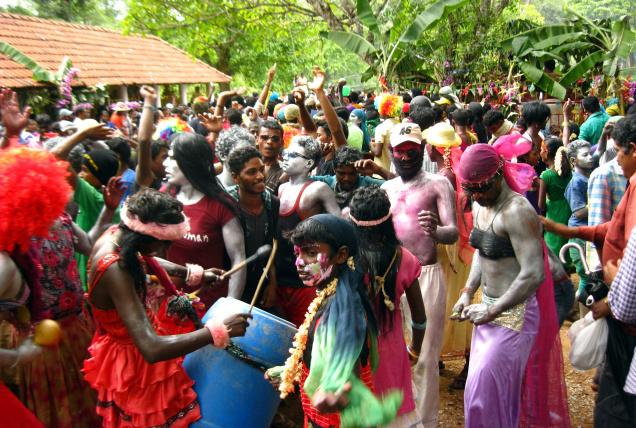
At ‘Kunde Habba’, the tribal people of Kodagu get their chance to cuss and rant away the insults heaped on them by others
I see, to my utter delight, that the tree under which thousands of tribal people have congregated to rain abuses is the frangipani. The delicate white flower rimmed with yellow is called ‘deva-kanagile’ (god’s flower) in Kannada, a name as gorgeous as the flower itself. The tree decked with flowers is a heartening sight, especially after being subjected to a spate of the choicest abuses. Some friends and I are at ‘Kunde Habba’ or ‘Bedu Habba,’ the annual abuse festival of the tribal people of Kodagu in Karnataka. Held on the fourth Thursday of May in Devarapura village near Gonikoppal, 200-odd km from Bengaluru, this is one day when the tribal people let out their grudges and vent their anger against god and fellow men in some of the filthiest words in Kannada and other dialects.
Kodagu or, in travel agent parlance, Coorg is home to some two dozen tribes. Some are honey gatherers-turned-mahouts, a few are into hunting. But the majority works in the coffee estates that dot the district’s verdant landscape. Their days are spent in rigorous physical labour and the evenings in dulled stupor induced by cheap country liquor. For them, the ‘Kunde Habba’ is their one chance, once a year, to abuse and rant away the insults heaped on them by others.
Legend has it that Ayyappa, the god of the tribals, took a group of them into the forest for hunting. Deep in the jungle, he came across the beautiful goddess Bhagavathi, fell in love and eloped with her, leaving the hapless tribal people stranded. Angry at this betrayal, the tribal people reserve this day to abuse their god for his old mistake — for not bestowing the boons they prayed for, for dreams unfulfilled and wishes unheeded. Over time, the festival has grown to become an outlet for their anger against employers — often wealthy coffee planters — and others who have bothered them. The participants take great care in the way they dress for the festival. Handbags readily become hats and an onion sack is turned into a dress. The men, who dominate the festival activities, take great pains to be in drag. Their hardened muscles gleam with sweat and silver paint. They sport bras stuffed with rags and miniskirts balanced precariously around belted waists. Make-up, most often, is gaudy. A little boy in an underwear pins a white flower near his crotch. Save for their size, there is little difference in the way boys, young men and old men look on this day.
Music is a vital part of the celebrations. Fertiliser tins, mineral water bottles filled with stones and large blue storage bins become drums for the day. Upcycling and recycling are clearly the norm, even if they may have never heard of these new-age terms.
Out in Gonikoppal town, during a break for tea that is too strong, almost bitter, we are bombarded by men in dresses, skirts and tight tops, rattling bottles and beating their drums. There appears to be no method, yet a catchy rhythm ensues. The going rate to get them to leave you alone is ₹10. The men barge into shops, collect money and, towards afternoon, congregate at the temple at Devarapura, where a village fair comes up. Plastic toys, knick-knacks and eats line the stalls as tattoo artists settle in their seats. Crude images of hearts, tigers, even Ambedkar are cut into chappal soles and PoP. These are dipped in ink and pressed on to the skin, after which the tattooist goes to work using an incredibly crude tool to poke through the design, rubbing colour and antiseptic turmeric in the end. Tattoos are cheap, starting at ₹50, or ₹10 per letter for a name.
Meanwhile, dancing around the tree continues. Devotees who have promised sacrifice to the gods throw several shocked chickens into the crowd, those who catch them get to keep them. My friends are miffed at not catching any. The drums get louder and louder, reaching a crescendo, until all the drums merge into a dull relentless thud. Women get ‘possessed’ and run in circles (only to sit back and check messages on their phones a few minutes later) and the dance gets raunchier as the alcohol kicks in. After prayers, they will go back to their haadis or settlements for a feast and many more rounds of drink.
Heartily abused, we feel like we could use a drink too. But instead, the oddly catchy tune of the abuses sticks in our head. We make up words to go along and drive further into the district, for elsewhere.
(Deepa Bhasthi is a freelance journalist based in Bengaluru)
source: http://www.thehindubusinessline.com / Business Line> BLINK> Watch / by Deepa Bhashti / June 09th, 2015

